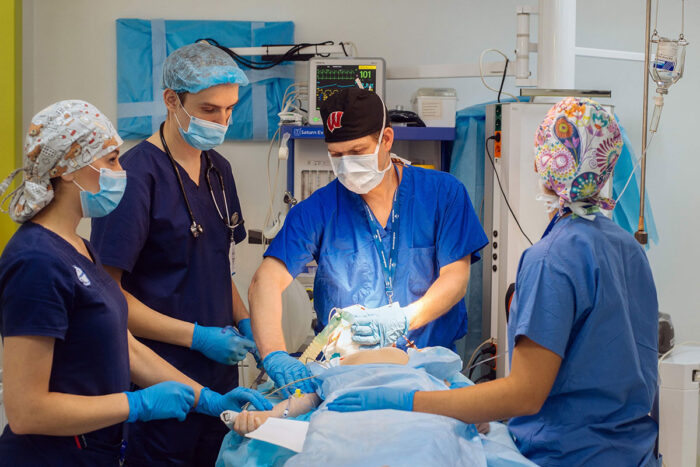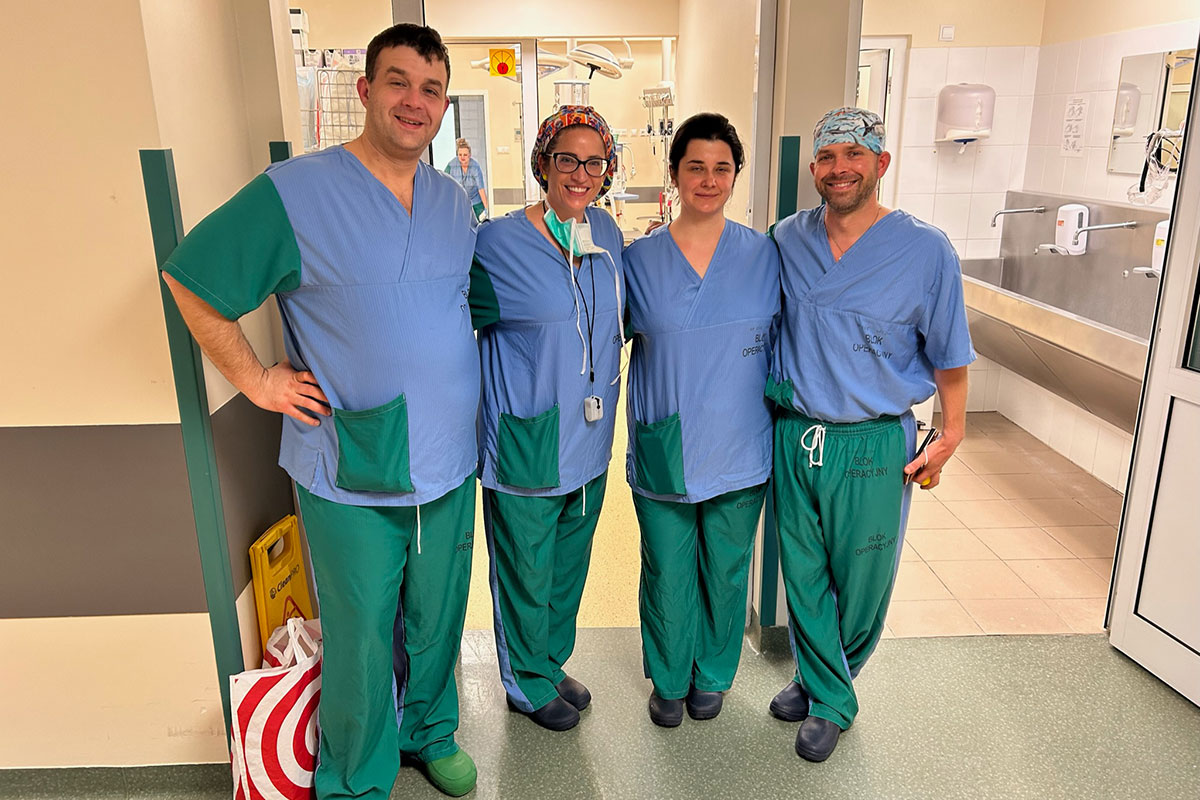Anesthesiologist volunteers with group that treats Ukrainian pediatric burn patients
Knittel works with the group Doctors Collaborating to Help Children
 Photo courtesy of Justin Knittel
Photo courtesy of Justin KnittelAnesthesiologist Justin Knittel, MD, (third from left) of Washington University School of Medicine in St. Louis, cares for a pediatric burn patient at Medicover Medical Center in Lviv, Ukraine, in fall 2019 as part of his longtime volunteer work with the group Doctors Collaborating to Help Children. He is pictured with Ukrainian anesthesiologists. The organization provides free plastic and reconstructive surgery to children in Ukraine, most recently at health-care facilities in Poland, near the Ukrainian border.
The teenage twins would be virtually mirror images of each other if not for the gnarled burn scar across one of the girls’ faces. When Justin G. Knittel, MD, met the twins at a hospital in Lviv, Ukraine, he noticed another stark difference: The girl without the scar was bubbly and bright-eyed while the girl with the scar acted reserved and sad.
“Every time the injured sister looked at her twin, she was met with a real-life image of how she looked prior to the burn,” said Knittel, an associate professor of anesthesiology at Washington University School of Medicine in St. Louis and a volunteer with a U.S. medical team that provides care for Ukrainian children with burn injuries and other potentially disfiguring conditions. “Life is hard enough as a child without having a visible burn scar that makes you different from other children. It’s devastating to go through childhood like that.”
Helping to reduce trauma for kids inspired Knittel to volunteer with Doctors Collaborating to Help Children, a nonprofit organization that for several years has provided free plastic and reconstructive surgery to children in Ukraine, most recently at health-care facilities in Poland, near the Ukrainian border. Ukraine is one of the poorest countries in Eastern Europe, impeding access for many to general medical care, much less surgical treatment. More recently, many of the nation’s hospitals, clinics and other health-related infrastructure have been damaged or destroyed due to Russia’s invasion of Ukraine in 2022 and ongoing war, as well as its previous aggressions against Ukraine.
The group began helping Ukrainian children well before the invasion last year. The health-care volunteers focused mainly on accidental burns suffered by children — electrical burns; injuries caused by scalding because of water heaters that lacked temperature regulation; or burns in homes heated by stoves or open fire. The volunteers also helped children with congenital abnormalities and other conditions that could be addressed with reconstructive surgery. But the fighting in Ukraine has added to the need; newer patients suffer from painful injuries from bomb blasts and other repercussions of war that Knittel and fellow volunteers do their best to address.
In all, there are more than 40,000 burn accidents in Ukraine each year, and about 10,500 of those involve children, according to the nonprofit group. Further, the best burn centers in high-income countries are capable of saving patients with burns over 90% of their bodies — but in low- and middle-income countries, patients with burns over 40% of their bodies quite frequently die, according to the organization.
“The trauma we see is devastating, but when you’re providing burn care in the operating room, you can’t focus on how someone’s life has been changed by their injury,” said Knittel, who has made 10 trips to Ukraine since becoming involved with the organization in 2012. “You just have to focus on the problem and how you can fix it. The goal is to restore function that will improve their quality of life as well as their self-confidence.”
In addition to providing anesthesia and accompanying care during surgeries, Knittel serves alongside plastic surgeons and other anesthesiologists to clinically assess and plan surgical procedures based on equipment available and time needed for such surgeries. He also works with the team to ensure the patients will have adequate follow-up and rehabilitation. As someone who specializes almost exclusively in adult trauma and critical care, Knittel said he sees the work in part as an opportunity to provide anesthesia to a different patient population than what he’s accustomed to and to “appreciate anesthesiology in a different light.”
During one week-long trip, Knittel and the team provided clinical assessments for 150 children and performed 50 surgeries aimed at improving physical function or appearance. “One of the most gratifying aspects is when you see kids feel better about improvements to their appearance, and especially improvements to their physical abilities,” Knittel said. “It’s where I feel like I’m part of a team that really makes a difference.”
 Photo courtesy of Justin Knittel
Photo courtesy of Justin KnittelHe and fellow team members form relationships with their patients over the years, since many of them return for follow-up visits and further procedures. Often, members of the group bring gifts and toys from their hometowns to give to the young patients.
Knittel’s involvement with the organization began when he was a medical trainee at Massachusetts General Hospital in Boston and was recruited by the organization’s founder, Gennadiy Fuzaylov, MD, a pediatric anesthesiologist affiliated with Harvard University.
“During a rotation in an intensive care burn unit, I developed a big interest in burn care,” Knittel said. “It is such a unique specialty and not often treated very well outside of very specialized centers around the country. I’ve been fortunate to experience high-level burn care, first in medical school in Cleveland, Ohio, at Metro Health Medical Center, and then in residency, at Massachusetts General Hospital and Shriner’s Children’s in Boston, which specializes in pediatric burn care.
“The disease process of burn injury is just so unique, it’s the epitome of resuscitation medicine and involves a deep understanding of critical care,” he said. “If I had done that rotation in medical school a few months earlier, there is a good chance I’d be a burn surgeon today. Seeing it from the plastic and reconstructive surgery side, being able to watch these surgeons plan out the procedures over literally years, and then coming back to see these kids year after year and see their improvement, it’s absolutely mind-blowing, the change.”
Another reason Knittel was so interested in working with the organization has deeper roots: His mother’s side of the family is from Ukraine.
“This trip really took on a personal meaning to me when I first arrived,” he said. “My mother had always emphasized our Ukrainian heritage, but I felt really disconnected from it. I knew of only one living relative who had ever actually traveled there. The family knew a few words here and there, mostly religious phrases that I could never appreciate since I knew absolutely nothing about the language. But over the years, I’ve tried hard to actually learn and study the language as best I could because it is personal now and gives me a connection to my family that I didn’t have before.”
Among the less pressing yet still deeply important aims for Knittel and the team of volunteers on their trips is to teach and provide education on a variety of medical topics, including anesthesia and burn treatment. After long days in clinics and operating rooms, the doctors eat dinner with Ukrainian leaders in government and health care. During these meetings, the health-care volunteers work to educate the leaders about burn prevention and advocate for policy changes aimed at helping to reduce the number of burn injuries that occur in Ukraine.
“We are really working side by side with Ukrainian and now Polish doctors to provide this care,” Knittel said. “We may practice in slightly different ways, based on our training and equipment, but our goal is the same: to provide safe anesthesia and perform procedures that help alleviate suffering, and aid in functional recovery for these patients. We try to talk and bond with our European colleagues, and we try to make the most of this opportunity to learn about other ways of practice while also offering guidance and advice based on our expertise and knowledge.”
For example, Knittel explained, the team has helped numerous Ukrainian children over the years who have suffered serious burns due to scalding water from unregulated water heaters. “Something as basic as requiring a maximum temperature on water heaters could prevent so many burn injuries,” he said. “These meetings with leaders in government and health care are so important because that’s where we’ve helped to establish burn-prevention programs, first-aid training, and a burn database to track and assess burn management on a larger scale. Hopefully, we won’t have as many burn victims in the future.”
Recently, Knittel went on his first such trip since having his son, Wesley, who will be 2 in December. He acknowledges that the trips have begun to feel even more personal.
“It’s definitely harder now that I have a son,” Knittel said. “You start making these direct comparisons. When I’m treating kids around my son’s age, it really hits close to home.
“At the end of the day, we’re all in this together,” he added, reflecting on the similarities of families across the globe. “We’re all trying to accomplish the same goal: Provide the best life for our children that we can.”







